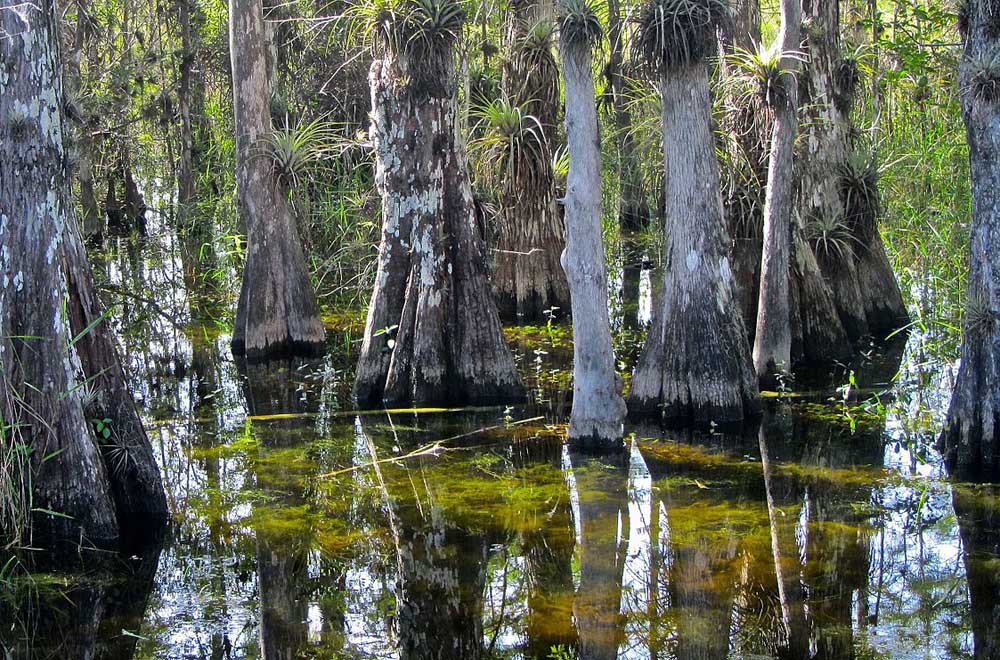
Swamp in Big Cypress National Preserve in Ochopee, Florida (Wikimedia Commons/ Antonio Chaves/CC-4.0)
One of our contemporary "signs of the times" of American culture is a widespread hostility toward government. Presidential candidate Donald Trump regularly tapped into this hostility in 2016 with campaign calls to "drain the swamp" of Washington, D.C.
Perhaps not so ironically the use of the phrase "drain the swamp" reveals a self-destructive ignorance and arrogance both about the good of swamps as ecosystems as well as the work of good governance.
While candidate Trump promised ethics and lobbying reforms, Noah Bierman reported that Trump has repeated the phrase "drain the swamp" as president to refer to anything or anyone whom he perceives as being in opposition to him and his power.
Instead of instituting any kind of reform of government, Trump has turned any notion of good government and the common good on its head. Democracy itself is under threat in many ways as the Trump administration has harnessed federal power for private financial gain. Such inversion of the purpose of government — from serving the common good to serving private ends — is exactly what St. Thomas Aquinas defined as evil.
The fragility both of swamps and good governance demand our constant care and attention. Sadly, perhaps tragically, as a society we seem to have lost touch with the many ways the federal government and the people who serve it provide public goods indispensable for a good society to thrive.
One of the most important things I have learned during my time in New Orleans is that swamps, contrary to popular opinion, ought not to be used as a pejorative. Far from being bad, swamps are integral to a good, healthy ecosystem.
Not only are swamps stunning in natural beauty, they are absolutely vital ecosystems that are indispensable for the health of the planet and local culture and economy. In south Louisiana, swamps and wetlands are critically important for mitigating hurricane damage, and they provide crucial habitats for crawfish, oysters, trout and migratory birds, and waterfowl like ducks, egrets and geese. Our local culinary delights, including the staples of Creole and Cajun cuisine, would not exist without the swamp.
Although swamps cover only 6 percent of the earth's surface, ecologist Julia Cherry explains that they are disproportionately responsible for a "high number of ecosystem services, in addition to maintaining biodiversity." She highlights a long list of benefits that swamps provide, including but not limited to improving water quality, recharging water aquifers, and serving as nature's sink when they are not suffering human destruction.
Not unlike the fragile good of swamps, as a society we need to attend to the good of government. Through much of U.S. political history there has been a consensus across party lines that government must play a primary role in keeping people safe. This can be seen not only in military defense but also in the development of child labor laws, fair labor standards and clean water and air policies developed over the past century.
Yet concern for keeping people safe and practically doing so through good government is under threat both from the current presidential administration and citizens who nurture hostility toward government.
As journalist Michael Lewis explains in The Fifth Risk, his best-selling book about the public goods delivered by the federal government, any concern candidate Trump expressed about ethical governance and lobbying reform flew out the window the moment he took up the transition from the Obama to the Trump administration.
The presidential transition is the first critical opportunity for an incoming administration to learn how the federal government practically prevents use of a dirty bomb, protects the nuclear arsenal, delivers medical care for veterans, maintains effective air traffic control, protects and guides food safety, and prevents and responds to a financial crisis, hurricanes and a possible cyber and/or terror attack that could leave the country without communication and power.
The presidential transition is so important that Max Stier, CEO of the Partnership for Public Service, helped Congress pass a law that requires an incoming administration to go through intensive briefings to protect the nation and maintain the stability of good government.
Lewis describes how the Obama administration worked tirelessly for nine months preparing transition materials for every department of new administration. Lewis reports that when President Barack Obama prepared perhaps the best transition briefing materials in history, Donald Trump's response was, "F--- the law. ... I want my f---ing money."
The "fifth risk" is perhaps the most important risk that the nation faces in the future, explains Lewis, relying on the experience of hundreds of federal employees who have devoted their lives to the federal government.
The fifth risk is the risk a society runs when it falls into the habit of responding to long-term risks with short-term solutions. Most long-term problems the nation faces are not about ideology but about practical management.
Lewis details hundreds of examples of mission-driven federal employees, not in public service for personal monetary gain, whose work has been critical for the good of society. It is not hyperbole to say that society would collapse without their service.
Some of his examples: Frazer Lockhart, working at the Energy Department, organized the first successful cleanup of a nuclear weapons factory in Rocky Flats, Colorado, 60 years early and $30 billion under budget. Eileen Harrington, working at the Federal Trade Commission, created the Do Not Call Registry that has saved millions of Americans from irritating sales calls. Steven Rosenberg, a researcher at the National Institutes of Health, pioneered an immunotherapy that has successfully treated previously incurable cancers.
Advertisement
Lewis highlights how the marvels of the internet, the iPhone, and GPS are the result of outstanding research and project management of the federal government. We forget that the federal government has been a vital partner in the most important innovations across the nation's history.
Instead of nurturing that experience and wisdom, as Lewis puts it, Trump has essentially taken a sledgehammer to the federal government.
While the incoming Congress must hold the president and his administration to account for their perversions of the Constitution, the Congress and people of faith and citizens alike need to celebrate and promote the many ways federal employees and institutions care for our ecosystems as well as the fragility of a good democratic society.
[Alex Mikulich is a Catholic social ethicist.]








